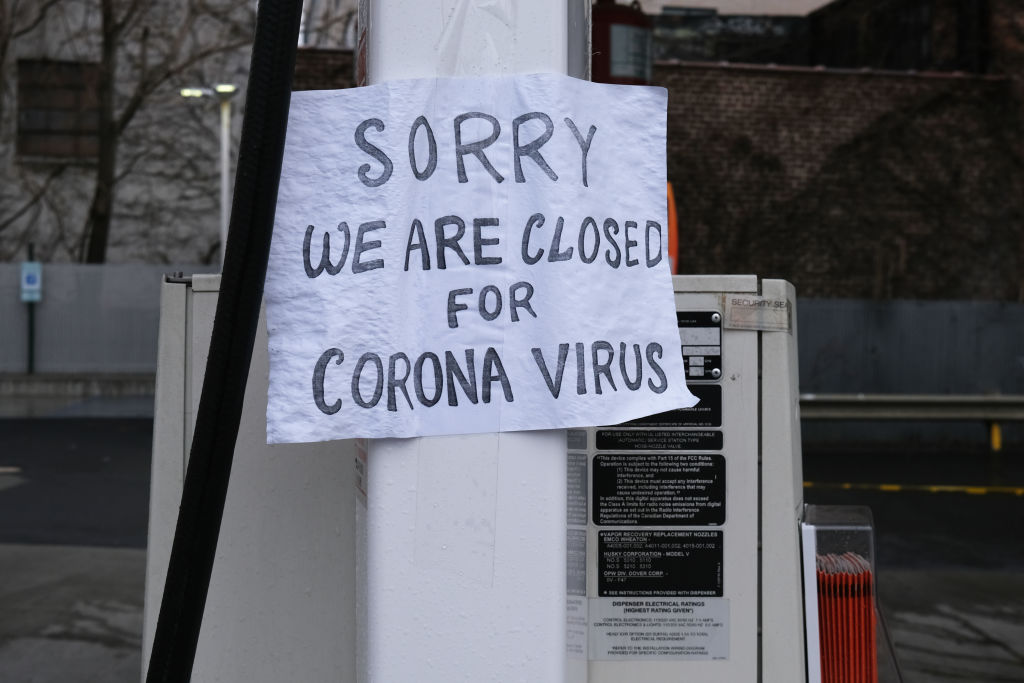Researcher says if U.S. reopens May 1, there would 'very clearly' be a coronavirus rebound


A free daily email with the biggest news stories of the day – and the best features from TheWeek.com
You are now subscribed
Your newsletter sign-up was successful
The White House is paying close attention to several models that use data to project the number of coronavirus hospitalizations and deaths that may take place in the United States, including one by the University of Washington's Institute for Health Metrics and Evaluation. On Sunday, the institute's director, Dr. Christopher Murray, appeared on Face the Nation to discuss a rolling reopening of the economy and how incomplete closures in some states will affect others with stricter social distancing guidelines.
Murray told host Margaret Brennan that the "issue is if you open up too soon and there is a big load of cases still in the community that have the potential to go back to community transmission, we can quickly see resurgences in some states. So some states it's possible in May, but in other states, it's going to be very, you know, very unlikely that that would not lead to an immediate resurgence."
States on the West Coast seem to be "farther along the epidemic, peaking, and then we need multiple weeks of closures after that peak to bring the burden of cases down to the points where testing and contract tracing has a chance of working," Murray said.
The Week
Escape your echo chamber. Get the facts behind the news, plus analysis from multiple perspectives.

Sign up for The Week's Free Newsletters
From our morning news briefing to a weekly Good News Newsletter, get the best of The Week delivered directly to your inbox.
From our morning news briefing to a weekly Good News Newsletter, get the best of The Week delivered directly to your inbox.
Since there wasn't a uniform implementation of social distancing closures across all states, a major question is how to control importation from outside regions. "We have rock solid evidence that the full closures work," Murray said. "We've seen that in Italy and Spain. We're seeing that out here out west. But what we don't know is do these sort of incomplete closures have the same impact."
In its initial testing, Murray's institute found that "if you opened up the entire country May 1, then we would very clearly have a rebound," he said. "We don't think the capability in the states exists yet to deal with that volume of cases. And so by July or August, we could be back in the same situation we are now."
A free daily email with the biggest news stories of the day – and the best features from TheWeek.com
Catherine Garcia has worked as a senior writer at The Week since 2014. Her writing and reporting have appeared in Entertainment Weekly, The New York Times, Wirecutter, NBC News and "The Book of Jezebel," among others. She's a graduate of the University of Redlands and the Columbia University Graduate School of Journalism.
-
 The Week Unwrapped: Have televised confessions quelled protests in Iran?
The Week Unwrapped: Have televised confessions quelled protests in Iran?Podcast Plus, why has Elon Musk turned from Mars to the Moon? And will the BBC prove to be a puzzles champ?
-
 The week’s best photos
The week’s best photosIn Pictures An Andean god, a rogue squirrel, and more
-
 ‘Zero trimester’ influencers believe a healthy pregnancy is a choice
‘Zero trimester’ influencers believe a healthy pregnancy is a choiceThe Explainer Is prepping during the preconception period the answer for hopeful couples?
-
 Trump HHS slashes advised child vaccinations
Trump HHS slashes advised child vaccinationsSpeed Read In a widely condemned move, the CDC will now recommend that children get vaccinated against 11 communicable diseases, not 17
-
 FDA OKs generic abortion pill, riling the right
FDA OKs generic abortion pill, riling the rightSpeed Read The drug in question is a generic version of mifepristone, used to carry out two-thirds of US abortions
-
 RFK Jr. vaccine panel advises restricting MMRV shot
RFK Jr. vaccine panel advises restricting MMRV shotSpeed Read The committee voted to restrict access to a childhood vaccine against chickenpox
-
 Texas declares end to measles outbreak
Texas declares end to measles outbreakSpeed Read The vaccine-preventable disease is still spreading in neighboring states, Mexico and Canada
-
 RFK Jr. shuts down mRNA vaccine funding at agency
RFK Jr. shuts down mRNA vaccine funding at agencySpeed Read The decision canceled or modified 22 projects, primarily for work on vaccines and therapeutics for respiratory viruses
-
 Measles cases surge to 33-year high
Measles cases surge to 33-year highSpeed Read The infection was declared eliminated from the US in 2000 but has seen a resurgence amid vaccine hesitancy
-
 Kennedy's vaccine panel signals skepticism, change
Kennedy's vaccine panel signals skepticism, changeSpeed Read RFK Jr.'s new vaccine advisory board intends to make changes to the decades-old US immunization system
-
 Kennedy ousts entire CDC vaccine advisory panel
Kennedy ousts entire CDC vaccine advisory panelspeed read Health Secretary RFK Jr. is a longtime anti-vaccine activist who has criticized the panel of experts
